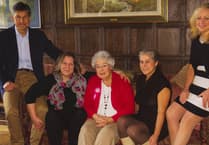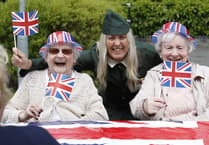IN 1951, three school teachers began a refugee charity in Woking that went on to help thousands of people who were homeless or without status.
Joyce Pearce, who headed the charity, Margaret Dixon and Ruth Hicks were concerned about the many displaced persons’ camps in West Germany.
These people were housed in terrible conditions in former German army barracks, far away from areas where refugees might have found work. They had no income and therefore could not pay for their children’s education.
Joyce was born in 1915 into a Woking family. Her maternal grandfather was Henry Quartermaine, engineer and entrepreneur, and her father, Vic, ran a radio shop in Chertsey Road. Her mother, Mary, had been brought up in a tradition of public service, as “Grandy” Quartermaine was a Justice of the Peace and three times chairman of Woking Council.
Joyce was educated at Woking County School for Girls and read history at Oxford University, followed by obtaining an education diploma. She held temporary teaching posts at Reigate, Chichester and Launceston, and by all accounts got on well with children.
During the Second World War, Joyce was a very young senior mistress at Mitcham Girls’ Grammar School.
She and the deputy head, Margaret, had a vision of creating a weekend residential centre for sixth-form pupils.
Joyce’s mother suggested they use a house – called Ockenden – that the family owned in White Rose Lane, Woking.
It became a success, but the house would soon be used for a much different purpose.
This was after Joyce and some pupils at a film appreciation weekend at Ockenden saw a film about the displaced persons’ camps in West Germany.
To coincide with the Festival of Britain in 1951, a plan was drawn up to bring a group of teenagers from West Germany to Ockenden for a holiday.
An appeal in the News & Mail resulted in donations to pay for the children’s fares. Seventeen youngsters made the trip and it was a great success.
This led to a fledgling scheme whereby refugee children would be allowed into England to be educated.
Named the Ockenden Venture, it became a registered charity in 1955. It was soon to expand – and in 1958, the charity took over Donnington School in Derby as a school for boys.
The same year, The Abbey, at Sutton Courteney in Oxfordshire, was bought by the famous Astor family.
In 1960, the Astors leased it to the Ockenden Venture for a peppercorn rent, and it was used as a refugee children’s home.
The Ockenden Venture went on to provide refugee aid both in the UK and overseas.
It set up schools for Tibetan refugees in India, sponsored the education of black South African children and brought Biafran refugees to the UK.
Educational and vocational centres for refugees were established in Sudan, Pakistan, Thailand and Cambodia.
Its role in the resettlement in the UK of Vietnamese boat people in the 1970s and 1980s was another of the Ockenden Venture’s great achievements.
Joyce, who had continued as the driving force in the charity for 30 years, died in 1985 and is buried in Brookwood Cemetery.
In 1999, the Ockenden Venture became Ockenden International. Today, most of its work is in Sudan, Afghanistan, Cambodia, Pakistan, Iran and Uganda. This is as a funding agency to local organisations.
The News & Mail has reported on the Ockenden Venture many times.
Peeps researcher Mark Coxhead has found a number of stories in back copies of the newspaper on microfilm at the Surrey History Centre in Woking.
A report from May 1959 said: “Queen Elizabeth, the Queen Mother, received a great ovation when she paid an informal visit to the Ockenden Venture and spent ‘a considerable amount of time chatting to the displaced children’.
“Her Majesty remained for more than an hour, and the programme arranged for her included national songs and dances, performed by the children in national costume.”
In January 1964, in an article headlined Honour for Ockenden founder, the News & Mail said: “Miss Joyce Pearce, whose idea to help refugee children has grown into an internationally known organisation, was made an Officer of the Order of the British Empire in the New Year Honours.”
Another story reported the visit of actress Ingrid Bergman. She “paid a tea-time visit to Woking’s Ockenden Venture – the refugee children’s organisation which this year celebrates its tenth anniversary.
“Smiling Miss Bergman was met at the White Rose Lane headquarters by Dr Christopher Woodward (chairman) and Miss Joyce Pearce, co-founder and honorary organiser of the Venture.
“Then, hugging two little Polish refugee girls, Miss Bergman posed for photographs. ‘I am very happy to be here,’ she said.”
Another story from the 1960s reported on the charity’s annual meeting, held in London.
At the meeting, Joyce spoke about her recent visit to India and the plight of Tibetan refugees.
She told the meeting there was a great need to help these “bewildered and courageous people” and she was hoping to start a campaign “for their alleviation at once”.



.jpeg?width=209&height=140&crop=209:145,smart&quality=75)

Comments
This article has no comments yet. Be the first to leave a comment.